This month: “24 Hour Party People”, “Admission”, “Behind the Candelabra”, “Black Rock”, “The Bling Ring”, “The East”, “A Horrible Way to Die”, “The Internship”, “Jules et Jim” (pictured above), “The Playroom”, “The Seasoning House”, “Skeletons”, “Warm Bodies” and “Westworld”.
I imagined Adventureland if it took place at Westworld and ended with Jesse Eisenberg discovering Kristen Stewart is a robot. The average rating is 5.47/10 with film of the month being the first 30 minutes of Jules et Jim. Follow @halfacanyon for more.
24 Hour Party People (2002) – 8/10
Director: Michael Winterbottom
Writer: Frank Cottrell Boyce
Starring: Steve Coogan, Shirley Henderson, Danny Cunningham
Tony: “I think that Shaun Ryder is on par with W.B. Yeats as a poet.”
Yvette: “Well, that is amazing, considering everyone else thinks he’s a fucking idiot.”
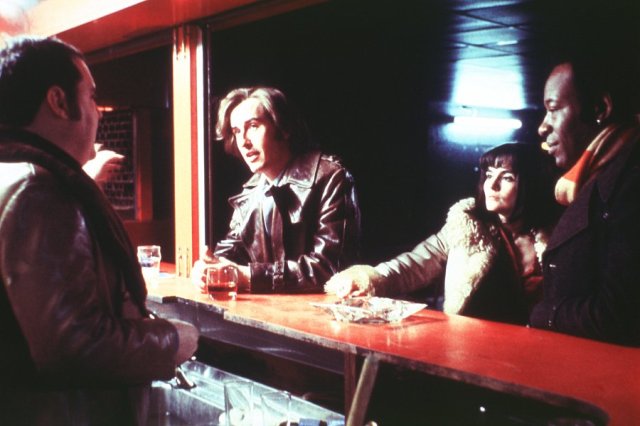 Steve Coogan’s heights involve playing tragic figures, whether Alan Partridge, the psychiatrist in Curb Your Enthusiasm, or Steve Coogan in any real life interview. So he’s a natural fit for Paul Wilson, the founder of Factory Records.
Steve Coogan’s heights involve playing tragic figures, whether Alan Partridge, the psychiatrist in Curb Your Enthusiasm, or Steve Coogan in any real life interview. So he’s a natural fit for Paul Wilson, the founder of Factory Records.
Winterbottom’s shaky camera follows the loquacious manager in between discovering The Happy Mondays and breaking the fourth wall. His career is intrinsically comical, even at its peak. The infamous Hacienda is frequently shown as an empty venue that’s unprofitable because punters took ecstasy instead of using the bar. Hilariously, the production cost of a New Order single outweighs the selling price.
Wilson remains upbeat throughout, which is the drama’s strength – an eternally optimistic figure claiming he’s protected himself from ever having the dilemma of selling out by never having anything to sell out. He even introduces himself as Icarus, a metaphor made even more absurd by how awful the “Madchester” scene truly is apart from one or two Joy Division singles.
The rambunctious era (I probably should have mentioned it’s the 1970s) lines up endless cameos and impersonators, and even a glimpse of the real Mark E. Smith. That celebration of nostalgia must be credited to Winterbottom who avoids the most obvious kind of biography, the kind that takes itself too seriously. After all, it’s a period that made a hero out of Bez.
For Wilson himself, his mistakes are deflected, as he’s just a minor character in his own story. For him, it’s about the music. For the viewer, it’s Icarus.
Admission (2013) – 4/10
Director: Paul Weitz
Writers: Karen Croner, Jean Hanff Korelitz (novel)
Starring: Tina Fey, Michael Sheen, Nat Wolff
“I’m so glad you’re going to Ecuador. Just one thing: I feel sorry for the Ecuadorians.”
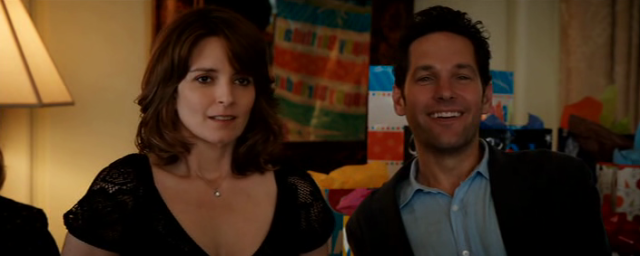 The Date Night formula continues: take a mediocre plot, add Tina Fey and a similarly likeable lead. In Admission, Paul Rudd replaces Steve Carell. And it’s so flat. The pair are so gifted at improvisation, that maybe that was the initial plan: a barebones script with space for spontaneous wit, surprise twists or anything, really.
The Date Night formula continues: take a mediocre plot, add Tina Fey and a similarly likeable lead. In Admission, Paul Rudd replaces Steve Carell. And it’s so flat. The pair are so gifted at improvisation, that maybe that was the initial plan: a barebones script with space for spontaneous wit, surprise twists or anything, really.
Yet Rudd and Fey are too restrained in a convoluted drama about an admissions officer possibly finding the son she gave up for adoption. It’s a shame, as they’re usually so watchable. By the end, it’s like watching strangers.
Behind the Candelabra (2013) – 7.5/10
Director: Steven Soderbergh
Writers: Richard LaGravenese, Scott Thorson (book), Alex Thorleifson (book)
Starring: Michael Douglas, Matt Damon, Rob Lowe
“Promise me you won’t tell anybody how I looked.”
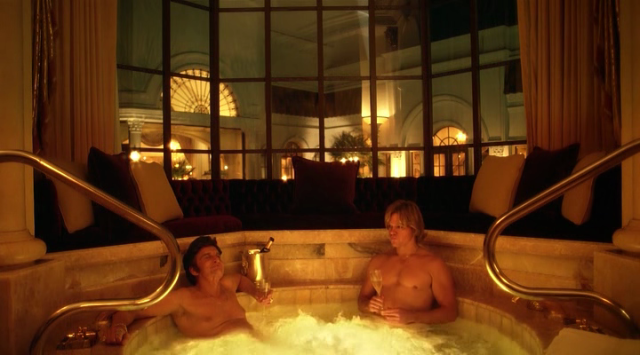 Wikipedia informs me a candelabra is often called a “candle tree”, which I’ve never heard before, but okay. I get it. Why one candle when you can have several branches? That attitude rumbles through Michael Douglas’ magnificent turn as Liberace – a performer both on and off stage.
Wikipedia informs me a candelabra is often called a “candle tree”, which I’ve never heard before, but okay. I get it. Why one candle when you can have several branches? That attitude rumbles through Michael Douglas’ magnificent turn as Liberace – a performer both on and off stage.
Instead of showbiz politics, Soderbergh magnifies Liberace’s emotionally draining and rewarding relationship with a hopeful vet (Matt Damon). The pair are forced into secrecy through homophobic pressure, yet Liberace’s mansion (and servants who “only see what they want to see”) fuels their closeness. The dynamics are fascinating: power struggles, different dreams, yet a deep, underlying love. Damon is mistaken for Liberace’s son – one is disgusted, the other is elated.
It isn’t quite a comedy, despite the advertising. Sadness permeates throughout when the masks no longer work. Damon’s earnest pleas are heartbreaking, and it’s hard to forget the arresting intimacy whenever Liberace feels comfortable enough to remove his wig. The “candle tree” needs those branches to carry all those lies and truths. After all, too much of a good thing is wonderful.
Black Rock (2013) – 6/10
Director: Katie Aselton
Writer: Mark Duplass
Starring: Katie Aselton, Lake Bell, Kate Bosworth
“We came out here to hunt. We’re going to hunt them down.”
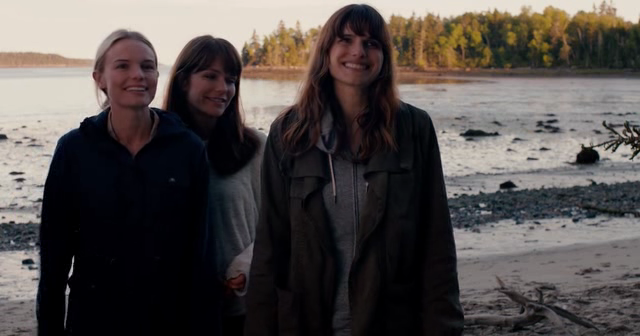 Adults complaining about The Hunger Games, you now have your own version in Black Rock: a creepily realistic fight-or-flight horror on an idyll island where only a hidden boom mic picks up the screams.
Adults complaining about The Hunger Games, you now have your own version in Black Rock: a creepily realistic fight-or-flight horror on an idyll island where only a hidden boom mic picks up the screams.
Three friends (Aselton, Bell, Bosworth) reunite for a camping trip that’s punctuated by the usual improvised dialogue you’d expect from a Duplass project. It’s a bit tedious – but, like a real camping trip, you have to persevere. The reward is rather unpleasant: an unfortunate encounter with trained soldiers who hunt down the trio for revenge. (It’s not as complicated as it sounds.)
Subsequently, the action is an astonishingly raw tale of survival. Each lead is breathtakingly tough and vulnerable, while the shaky camera pinpoints dangerous shadows hiding in the trees.
It’s frighteningly animalistic, all without finding Hostel-type pleasure in torture. The subtext is in gender politics and the damaged masculinity of ex-soldiers, avenging stubborn ideals. And for pure drama, Black Rock discovers true feelings surface when you’re naked in a ditch, fearing for your life. If only that energy emerged sooner.
The Bling Ring (2013) – 5/10
Director/Writer: Sofia Coppola
Starring: Katie Chang, Israel Broussard, Emma Watson, Leslie Mann
“Let’s go to Paris’s. I want to rob.”
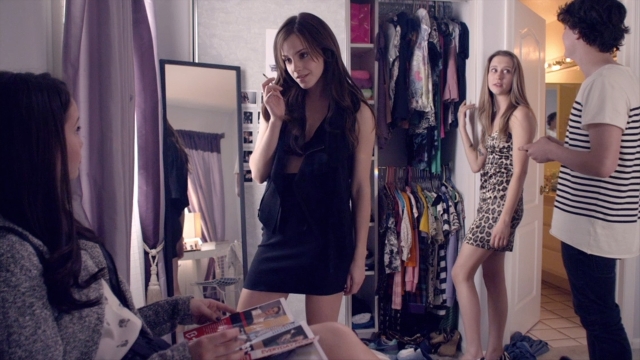 Sofia Coppola’s screenplay originally opened with a Nicole Richie tweet: “Life is crazy and unpredictable… my bangs are going to the left today.” Instead of semi-ironically philosophising Richie’s already semi-ironic tweet, the crime comedy opens with handheld camera footage of teenagers breaking into a Hollywood home. That’s Coppola’s take: celebrities are demystified, and the viewer becomes a silent participant.
Sofia Coppola’s screenplay originally opened with a Nicole Richie tweet: “Life is crazy and unpredictable… my bangs are going to the left today.” Instead of semi-ironically philosophising Richie’s already semi-ironic tweet, the crime comedy opens with handheld camera footage of teenagers breaking into a Hollywood home. That’s Coppola’s take: celebrities are demystified, and the viewer becomes a silent participant.
When the music first kicks in, it’s Sleigh Bell’s “Crown on the Ground” – a song that already sounds like an MP3 poorly ripped from YouTube and blasted on tinny laptop speakers. That low-quality, imitation-led aesthetic is the tiny sheen added to the original Vanity Fair article on which the screenplay is based.. Remember the elaborate plans in Tower Heist and Ocean’s Eleven? Well, these kids used social media to work out when a celebrity was at a party, and then found the address through Google Maps. Remarkably, Paris Hilton leaves a key under the doormat. (I do not, if any potential thieves are reading.)
The gang resembles a Nickelodeon version of Spring Breakers: four girls and a Harry Styles lookalike commit crime, snort lines and take selfies with dollar bills – but always redolent of adolescents tasting alcohol for the first time. They even document their exploits on Facebook (pre-Instagram, so the embarrassment isn’t smudged out) before sort of learning a lesson.
The leads deliver sass and childishness when required. They’re fun roles (with Emma Watson gifted the most memorable lines), but hard to distinguish apart from physicalities. With the loss of identity, the YouTube generation shies from creativity and morphs into impersonating Hollywood stars. The group aren’t searching for money (they seem well off already), but desperately seeking clothes. If they could wear Lindsay Lohan’s skin, they would.
Coppola’s direction is usually so expressive, but The Bling Ring is plainer. Maybe back in 1785 Marie Antoinette chilled out to The Strokes, but these kids rap badly to Kanye West – out of tune, missing the beat, and skipping half the words. These threadbare scenes unveil the burglars as oblivious to a world outside of social media. The mantra becomes: why bother doing something if you can’t present the evidence to the internet? After all, what is my compulsion to share this review with you, the reader?
I’m unsure why Coppola chose such a reserved stance: it rarely celebrates their exploits more than any typical montage, and is too timid to slam their shallowness. Any social satire is more of an amusing skit (like Watson’s post-arrest reinvention). It’s watchable, if only for the excellent source material, but can’t add much to the Vanity Fair article.
There’s a snippet of the adaptation’s potential for one short minute when Israel Broussard shares a secret: “I loved her. I really did.” His crush glides past in slowmo, accompanied by dreamy music and the action pauses; the throes of teenage adventure when everything is experienced for the first time, seemingly without consequence.
The rest is like the protagonists’ karaoke sessions: fun at the time, but instantly forgettable.
The East (2013) – 7.5/10
Director: Zal Batmanglij
Writers: Zal Batmanglij, Brit Marling
Starring: Brit Martling, Alexander Skarsgard, Ellen Page, Patricia Clarkson
“We are glad to be given a taste of our medicine.”
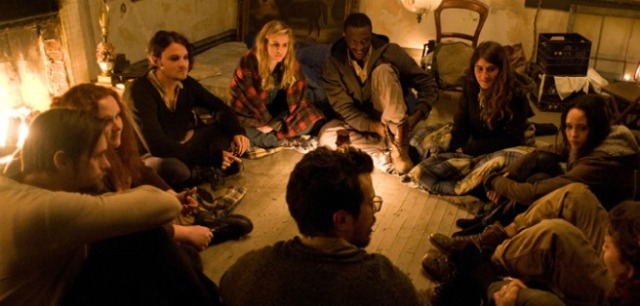 Matmanglij and Marling collaborated on last year’s excellent Sound of My Voice: a future cult classic about time-travel. The East follows similar beats, albeit swapping investigative journalism for spontaneous espionage. A Venn diagram would cover how much the two plots overlap. Really, the main difference is tonal than thematic: The East is substantially more mature and refined, and not always to the drama’s benefit.
Matmanglij and Marling collaborated on last year’s excellent Sound of My Voice: a future cult classic about time-travel. The East follows similar beats, albeit swapping investigative journalism for spontaneous espionage. A Venn diagram would cover how much the two plots overlap. Really, the main difference is tonal than thematic: The East is substantially more mature and refined, and not always to the drama’s benefit.
Marling, the protagonist, is hired as a corporate spy to infiltrate a political activist group called The East. Once inside the organisation, she is slowly swayed by their anarchist movement seeking “eye for an eye” revenge on major businesses polluting the environment. Oh, and there’s a handsome gang leader (Skarsgard) whose smouldering eyes can supposedly change anyone’s conviction. (Although he doesn’t at any point turn to the camera and request a positive review.)
I wouldn’t call it propaganda (it definitely isn’t), but there are small traces of Chinatown with polluted rivers exposing a city’s decaying morals. The smart story is efficiently worked out by accomplished actors, right down to small roles for Ellen Page and Shiloh Fernandez. If anything, it’s too well packaged to convey the passion behind an underground movement.
Batmanglij’s second directorial feature is shaped by higher production values and tighter editing. The thriller’s glossy heartbeat (and ever-present “something exciting is happening” soundtrack”) will appeal to wider audiences. In doing so, it might disappoint fans of Marling’s Another Earth and the pair’s Sound of My Voice. Those two vaguely sci-fi dramas found borderline adolescent poetry in literally staring into space; that an unsettled twenty-something could escape to another planet or join a time-travelling gang. The East covers the same idea, perhaps with more vigour, but those vacant moments are rushed by adrenaline and tenser thriller beats.
I noticed a tendency to fill silences with any noise to heighten tension, whether a Christian radio station in the car, a pounding score, or even a droning hairdryer. Within a mainstream structure, metaphors become more heavy-handed (images of dogs on leashes; Marling describing herself as a dog on a leash; activists impersonating dogs; eating food from a bowl like a dog; I could go on). The East questions the concept of flickering identity; the roots of belief are more to do with personal experiences than one likes to admit. As a thriller with a brain and conscience, it can even find a dramatic climax in a spy eating an apple out of the bin.
A Horrible Way to Die (2010) – 4/10
Director: Adam Wingard
Writer: Simon Barrett
Starring: AJ Bowen, Amy Seimetz, Joe Swanberg
“How can you run if you can’t even walk?”
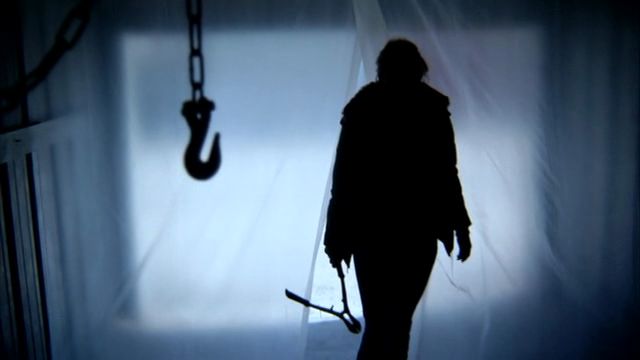 Like a line in a Paul McCartney song I can’t remember, two roads heading the same direction will inevitably meet. That structure doesn’t always work. Sure, there’s Sleepless in Seattle and Crime and Misdemeanours, but don’t forget Serendipity.
Like a line in a Paul McCartney song I can’t remember, two roads heading the same direction will inevitably meet. That structure doesn’t always work. Sure, there’s Sleepless in Seattle and Crime and Misdemeanours, but don’t forget Serendipity.
A Horrible Way to Die (which also happens to be a horrible way to title a film) runs two stories concurrently without much effect. In one strand, a serial killer (AJ Bowen) escapes custody and leads a bloody spree in search of his ex-girlfriend. In between bloodstained scenes, that unlucky woman (Amy Seimetz) recovers from the trauma in Alcoholics Anonymous.
Seimetz certainly holds the stronger storyline; seemingly dead on the inside, she struggles to swat away poisonous memories. The antidote comes from a tentative relationship with Joe Swanberg. Borne out of loneliness, the pair make deathly dull small talk that’s oddly comforting, when a night alone at home is the only other option.
Swanberg and Seimetz find small doses of poignancy – certainly more than their partnership in Alexander the Last. Their arc’s biggest obstacle is, well, the film’s hook. Bowen is saddled with the role of a cliched killer: verbose and with a Facebook fan page. His murderous road trip perhaps works better on paper, but reduces the drama to knock-off horror. A disturbed, claustrophobic tone lingers without much point – as mentioned earlier, the inevitable resolution isn’t thematic; just mechanical plotting.
The Internship (2013) – 4.5/10
Director: Shawn Levy
Writers: Jared Stern, Vince Vaughan
Starring: Vince Vaughan, Owen Wilson, Rose Byrne
“Sometimes the long shots pay off the biggest.”
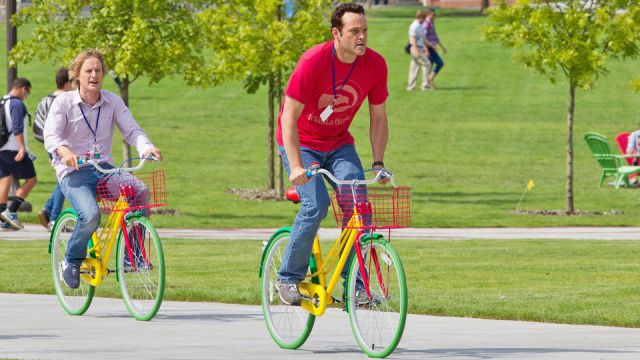 The middling score reflects my confused reaction – did I just watch a two-hour Google advert? That night, I slept muttering “Googlism” as a stirring mantra, dreaming of electric sheep jumping over a wall emblazoned with Google’s logo. Google, Google, Google. I think it’s only about 20 minutes until Vince Vaughan says, “Google it.”
The middling score reflects my confused reaction – did I just watch a two-hour Google advert? That night, I slept muttering “Googlism” as a stirring mantra, dreaming of electric sheep jumping over a wall emblazoned with Google’s logo. Google, Google, Google. I think it’s only about 20 minutes until Vince Vaughan says, “Google it.”
What’s more, The Internship is unfunny, predictable, full of stereotypes and shameless with its product placement – yet I didn’t hate it. I think I even like it, and I’m not sure why. Maybe it’s the comedy’s eternal optimism (frequently attributed to Google). Maybe it’s the subconscious power of advertising. Or maybe I’m a sucker for Owen Wilson’s charm and spending two hours with a formulaic plot where geeks win the battle against… other geeks.
The storyline (described by The Onion as poised to be the biggest comedy of 2005) sees two middle-aged losers (Vaughan and Wilson) starting an internship at Bing. No, I’m kidding. At Google’s luxurious building (where cars drive themselves, and the logo shines in the sun), teams compete for a full-time position.
Our “heroes” stick out in a crowd of 19-year-old whizz kids like an incorrect search result; the joke is that surely these two computer idiots can’t win a lucrative tournament based on tech knowledge, coding and debugging. Surely?
Fortunately (for them, not necessarily the viewer), each round is designed for comedic set-pieces, rather than a true test of ability. For instance, there’s a lengthy game of Quidditch (presumably through market research conducted via Google Analytics) and other tests climax with a Google employee reciting jargon about the company’s core beliefs: diversity, creativity, Vince Vaughan playing a nice guy for a change.
The Internship is overpopulated by stereotypes – a few racially one-note characters; a sexy workaholic manager who needs to let her hair down; countless geeks who love Star Wars and cosplay; a stripper with a heart; a posh rival who finds his comeuppance. It goes on. At times it’s a less annoying version of The Big Bang Theory.
While formulaic, The Internship retains enough charm to avoid walkouts, even if I rolled my eyes throughout. The high spirits are likely down to the Google influence, which is hard to underplay. Even the end credits serve as an advertisement for Google+, Google Chat, Google Video and Google Mail. (Not Google Buzz, funnily enough.) Google’s presence is so shameless, I sort of admire it. At the very least, I prefer the openness to Lois Lane lugging a Nikon camera around.
So to recap: lazy stereotyping, product placement, dated concept, few laughs and even fewer surprises. Yet I have a soft spot for it and almost want to see it again. That’s the power of advertising.
Jules et Jim (1962) – 6.5/10
Director: François Truffaut
Writers: François Truffaut, Jean Gruault, Henri-Pierre Roché (novel)
Starring: Oskar Werner, Henri Serre, Jeanne Moreau
“One always feels guilty in a hotel room. I’m not very moral, but I dislike it.”
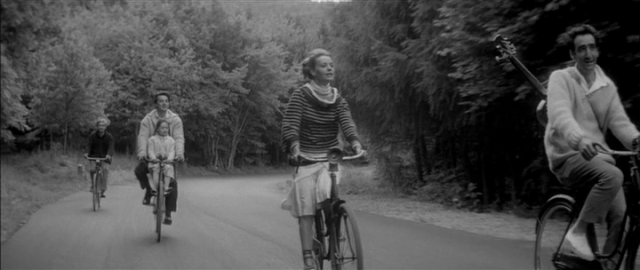 Truffaut’s influence on Wes Anderson is evident through camera movement, letter writing and droll philosophising. Of course, critics in 1962 weren’t making those comparisons (apart from the psychic ones). No, there’s a freshness to Jules et Jim in the opening act, where the excitement of meeting someone new is mirrored by playful editing and camera tricks.
Truffaut’s influence on Wes Anderson is evident through camera movement, letter writing and droll philosophising. Of course, critics in 1962 weren’t making those comparisons (apart from the psychic ones). No, there’s a freshness to Jules et Jim in the opening act, where the excitement of meeting someone new is mirrored by playful editing and camera tricks.
Set in 1912, Jim and Jules (feels weird writing it in that order) stare at a statue for an hour, only for the human embodiment to appear in the form of Catherine. They’re instantly smitten – at least with the idea of what she represents. It’s an idea that’s trite and overdone now, but Truffaut tackles the exhilaration with class; at certain points, the frame pauses to capture the moment, long before Instagram produced a crude alternative to memory.
Catherine’s presence overshadows every following moment. After the war, she settles down into an elusive figure who won’t slot into Jules’ misogynistic view of how women, unlike men, should be exempt from infidelity. It’s unclear if she’s seeking revenge or simply floating independently, but it drives the two men slowly instance – all in a rural area where empty paths are flooded by angst.
I know the post-war scenes (which make up the majority) are supposed to lack the early spontaneity, yet I lost patience a few times. The emotions slowly become harder to follow when Jim and Jules (still feels weird) deviate from human beings into plot ciphers. By the third act, I was crying for a gear change.
Still, there’s plenty to admire, particularly when Truffaut’s imagination runs free. At one point, Jim draws a face on a table, and a friend dons a cigarette to pretend to be a steam train. With the simplest instruments, a buzz runs through black-and-white pathos; the final two acts can’t catch up.
The Playroom (2013) – 3/10
Director: Julia Dyer
Writer: Gretchen Dyer
Starring: John Hawkes, Molly Parker, Cold Linley
“Sam, if you keep your coat on all the time, it won’t keep you warm when you go outside.”
“I know.”
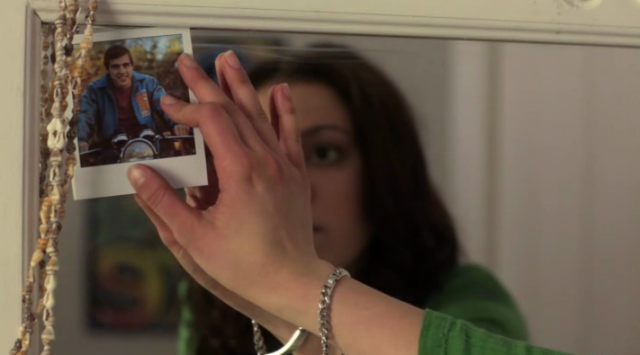 A defining image occurs within a few minutes: children clean up their parents’ beer bottles and ashtrays, as if a regular routine. It’s perfect and tells you everything you need to know without resorting to dialogue. Like a mime, perhaps.
A defining image occurs within a few minutes: children clean up their parents’ beer bottles and ashtrays, as if a regular routine. It’s perfect and tells you everything you need to know without resorting to dialogue. Like a mime, perhaps.
The split storyline is set within the family house: wife-swapping parents downstairs, while their children invent stories upstairs. The premise has potential and, to the film’s credit, it takes 45 minutes to realise how poorly written is all is: undefined characters, little development, rushed climaxes, overwrought metaphors.
I wouldn’t be surprised if it was really written in a single night inspired by viewing Who’s Afraid of Virginia Woolf for the first time. Except The Playroom only lasts 75 minutes, as if they stopped at the earliest opportunity. When infidelity occurs, it’s like an amateur improv class where the participants have been given no background information.
And then I realise that opening image is embarrassingly over-the-top. How wrong I was.
The Seasoning House (2013) – 2.5/10
Director: Paul Hyett
Writers: Paul Hyett, Conal Palmer, Adrian Rigelsford, Helen Solomon
Starring: Rosie Day, Kevin Howarth, Sean Pertwee
“One day this will all be different. We will get away from this place.”
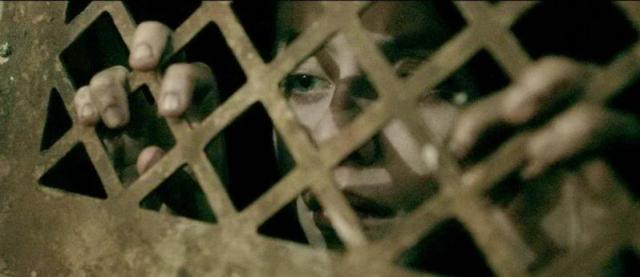 Advanced warning: The Seasoning House is not for the faint hearted, or cinemagoers with other options. Set during the Balkan war, further misery is laid out by setting the horror in a brothel that specialises in child prostitution. The protagonist, Angel, is a young, deaf orphan responsible for injecting and cleaning the battered workers. It’s grim, and that includes the supporting performances.
Advanced warning: The Seasoning House is not for the faint hearted, or cinemagoers with other options. Set during the Balkan war, further misery is laid out by setting the horror in a brothel that specialises in child prostitution. The protagonist, Angel, is a young, deaf orphan responsible for injecting and cleaning the battered workers. It’s grim, and that includes the supporting performances.
Angel (played adequately by Rosie Day in her first film role) is understandably reticent. She befriends a mouse and repeatedly hides inside wardrobes, peeking through the gaps at horrible acts of violence. In a way, the viewer is stuck in the same position: spying on horrible scenes, unable to escape, questioning why any of it is happening.
I’m having difficulty gauging if The Seasoning House has any meaning. The war setting seems crudely tacked on as plot framing device, while the unoriginal gender politics surrenders to conventional thriller cliches. In terms of exploitation, it could be harsher to be redolent of wartime torture. It’s also the kind of film where guns and knives are interchangeable, depending on whether the screenwriter wants a character to die or survive.
First-time director Paul Hyett has mainly been a make-up effects artist since 1998, and that’s the film’s main, and perhaps only, strength. The camera glides at plaintive angles across delicate shots that don’t fit the subject matter. If Hyett’s aiming for a fairytale, then he’ll have to do better than dull sequences of young girls slumped across beds; bruised and silent, they hint at a director more comfortable with fake blood than dialogue and character.
The swirling music comes from a more wistful drama. It’s rarely interrupted, unless by a laughable villain or gunshot. Whenever someone dies – whether prostitute or soldier – it’s hard to muster any emotion, other than boredom.
Skeletons (2010) – 5.5/10
Director/Writer: Nick Whitfield
Starring: Will Adamsdale, Andrew Buckley, Jason Isaacs, Tuppence Middleton
“You’re very tall.”
“Yeah.”
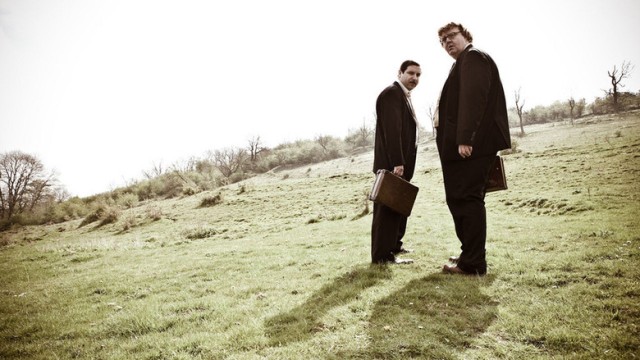 Existential investigations. We’ve all done it, whether on a slow commute home from work, or maybe even when writing a review for a blog that fills in the empty gaps of life that would otherwise be filled with happiness. Skeletons is a bit more literal, with a pair of detectives who use paranormal techniques to delve into their clients’ memories.
Existential investigations. We’ve all done it, whether on a slow commute home from work, or maybe even when writing a review for a blog that fills in the empty gaps of life that would otherwise be filled with happiness. Skeletons is a bit more literal, with a pair of detectives who use paranormal techniques to delve into their clients’ memories.
It’s too ramshackle to compare with Inception or Eternal Sunshine of the Spotless Mind. The low budget is complemented by deadpan comedic exchanges; the pair bumble along until they’re stumped by Middleton (who I’ve recently discovered to possess wonderful comic timing). With a warm and gentle tone, there’s potential unmatched by a script that lacks the necessary spark to ingrain Skeletons into the memory. Consequently, you might need to hire the agency to remind you in a few decades.
Warm Bodies (2013) – 5.5/10
Director: Jonathan Levine
Writers: Jonathan Levine, Isaac Marion (novel)
Starring: Nicholas Hoult, Teresa Palmer, Rob Corddry
“Be dead.”
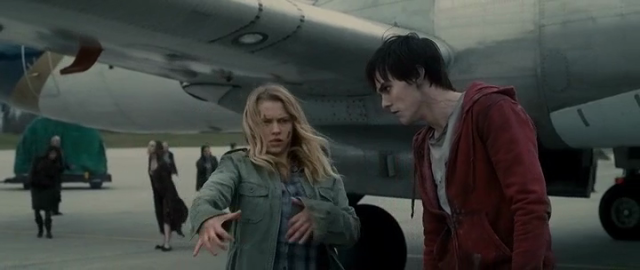 The zombie craze should have died when the internet was flooded by unfunny, hypothetical “who would you eat first?” discussions, but, fittingly, it won’t die. Warm Bodies taps into the genre, mainly as a selling point, preferring to comment on a geek movement by siding with Twilight-ish teen romance.
The zombie craze should have died when the internet was flooded by unfunny, hypothetical “who would you eat first?” discussions, but, fittingly, it won’t die. Warm Bodies taps into the genre, mainly as a selling point, preferring to comment on a geek movement by siding with Twilight-ish teen romance.
Nicholas Hoult is the valiant undead hero dawdling in deserted streets and hunting for human flesh. After eating Teresa Palmer’s boyfriends brains, he inherits elements of his personality – namely, love. The queasy romance between zombie and breathing, blonde beauty is mined for semi-amusing gags. Even a young adult demographic wouldn’t be fooled this easily. So it’s worth crediting Levine for not patronising his audience (even if I’m patronising him in the process) with playful images and teenager-friendly humour.
That’s not to say it’s a masterpiece. Really, I’m just comparing it favourably to Twilight. It doesn’t change much for the genre. It’s hard to ignore how many elements are recognisable from Shaun of the Dead’s most memorable sequences: pretending to be a zombie, and killing zombies with an 80s jukebox plays – as if the “romzomcom” homage wasn’t enough.
Machismo takes a non-fatal hit with adolescent undead men incapable of expressing emotions. The metaphor isn’t particularly deep, but Hoult spends the 98 minutes wearing a red hoodie that I use all the time – one of the self-indulgent points you wouldn’t get from any other reviewer, so sorry.
It’s passable entertainment without much originality; oddly likeable for its lack of cynicism, considering it was probably sold to Hollywood with a Venn diagram. Against all odds, the warmth isn’t just from CGI hearts, but from semi-serious, semi-romantic lines like: “…but you didn’t eat me.” So it deserves some semi-praise.
Westworld (1973) – 8.5/10
Director/Writer: Michael Crichton
Starring: Yul Brynner, Richard Benjamin, James Brolin
“I almost believe all this.”
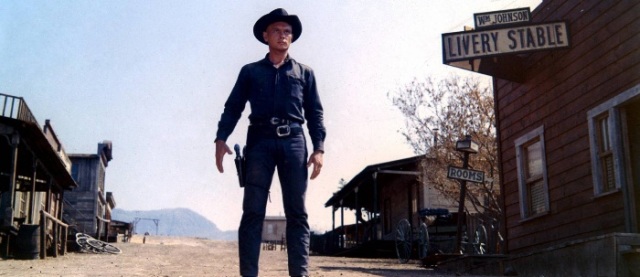 In a way, Jurassic Park was a fossil left over from Westworld. Crichton had an earlier idea for an alternate amusement park: an enclosed area where lifelike robots fulfil the fantasies of rich tourists. (Yes, as parodied in that episode of The Simpsons.)
In a way, Jurassic Park was a fossil left over from Westworld. Crichton had an earlier idea for an alternate amusement park: an enclosed area where lifelike robots fulfil the fantasies of rich tourists. (Yes, as parodied in that episode of The Simpsons.)
The themed holiday destination is characterised like an old Western film, complete with saloons, gunslingers and brothels. It suggests that even in a dystopian future, technology’s crowning moment will be bringing consumers closer to life within a movie. That explains Yul Brynner’s role as an android designed to always lose a gunfight to humans – the dream isn’t just to be Clint Eastwood, but one that kills machines.
Westworld questions human desire even further, given the rampant sexual abuse of humanoids. Male dominance is computerised, and Crichton satirises ugly selfishness with striking images and a popcorn plot. When the robots malfunction and seek violent revenge, I want them to succeed.
The villains strike a more distinctive chord through their human appearance, just as The Terminator built a franchise through Arnie’s idiosyncratic figure. The scientists may find it oddly satisfying that their inventions are too powerful. I saw something different: not revenge, but mankind running away from a truthful reflection. Both are equally frightening.
Follow @halfacanyon for more.

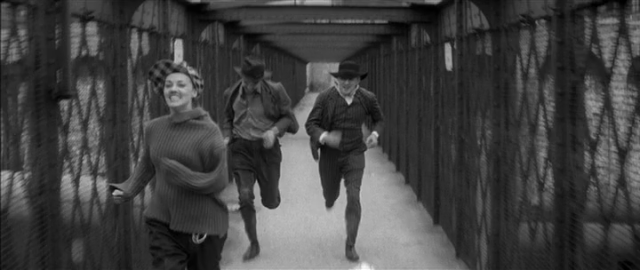
Pingback: Kenicky’s 2013 film roundup | HALF A CANYON: The Greek chorus of UK film blogs